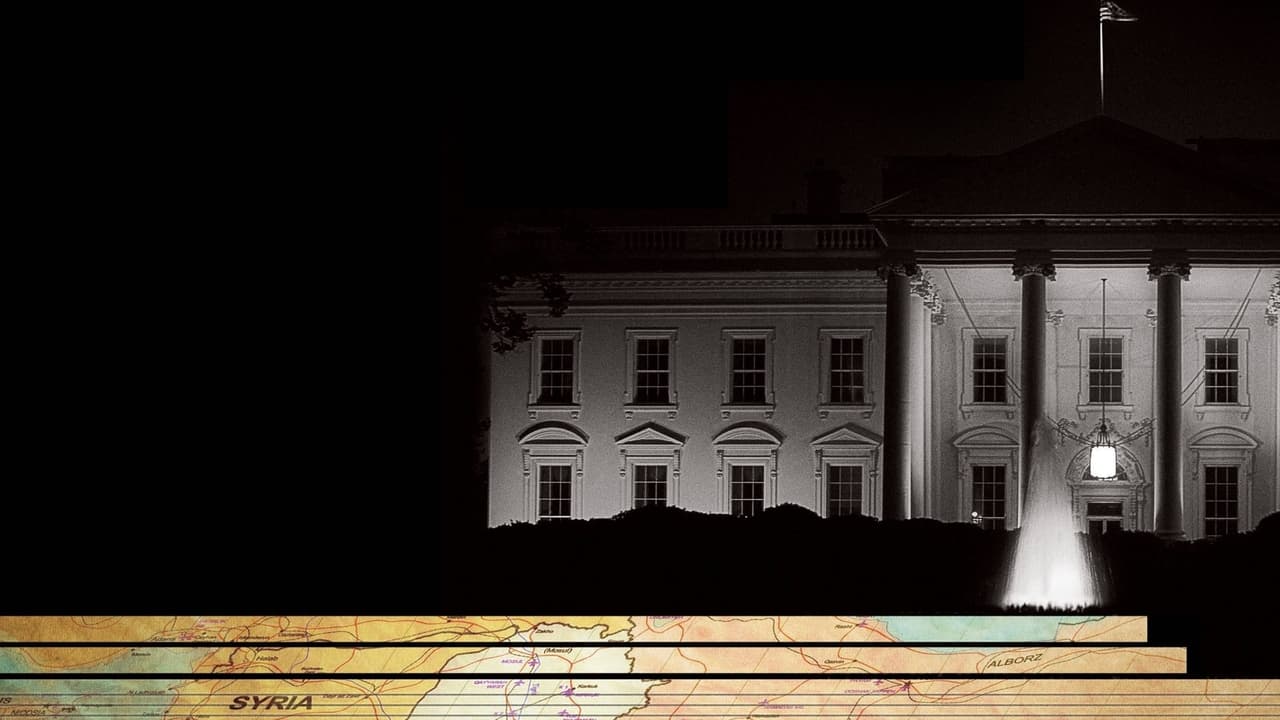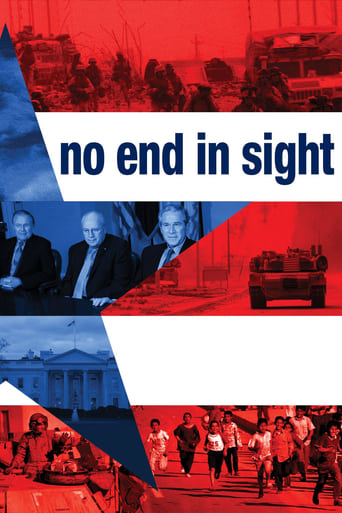

Yawn. Poorly Filmed Snooze Fest.
... View MoreIt is both painfully honest and laugh-out-loud funny at the same time.
... View MoreGreat example of an old-fashioned, pure-at-heart escapist event movie that doesn't pretend to be anything that it's not and has boat loads of fun being its own ludicrous self.
... View MoreExactly the movie you think it is, but not the movie you want it to be.
... View MoreThis documentary focuses on the post invasion mistakes made by the administration and problems of occupation and factors leading up to the insurgency.It does a great job of putting together what has happened since the invasion of Iraq. I think it would have been hard to get a clear picture from newspapers and TV news. This is not a Michael Moore style documentary - it's less in your face but no less effective. There are interviews with many relevant people from the administration and Iraqis as well.A couple of small faults. A lot of information is given very fast. It's a bit hard to remember who is who. They should have left the names and designations of the persons a bit longer on the screen when the person is talking. A bit more background on the people interviewed might have helped the viewer understand what they are trying to put forth.A very well done documentary that should be seen by all. Makes one want to find out more about the situation right now in Iraq and what has happened to the people who screwed up the occupation. Also it makes one wonder what will happen to Egypt and Tunisia etc when power is being transferred to the new government.
... View MoreOne of the interviewees muses that rebuilding Iraq would be difficult, that there were 500 ways we could go wrong and only 2 or 3 in which we could go right. "We didn't realize," she concludes, "that we were going to go through all 500." Is this a Bush-bashing propaganda piece? Not really. Bush rarely comes up, partly because he was out of the loop on most of the important decisions, such as disbanding the Iraqi army, de-Ba'athifying the nation, and so forth. He'd evidently turned all of that over to the people who really get clobbered here, namely Cheney, Wolfowitz, Bremer, and especially Rumsfeld.The film lays out for us things that generally most of us already know about. It's not about combat, except insofar as combat appears as a consequence of mismanagement at higher levels. It doesn't jerk easy tears. A few soldiers tell us what it's like to be blown up. A few Iraqis describe kidnappings of their friends, neighbors, and children. But nobody breaks into sobs and shows us his wounds, and the anecdotes aren't detailed. The justification for the war is barely touched on, and Constitutional issues aren't raised. There's hardly any musical score and it's not melodramatic. The appeal is to logic and perception, not emotion, although nobody would call the film dull in any way.The interviewees we meet are sober and convincing, even as they confess their own misjudgments. Rumsfeld and the rest refused to be interviewed for obvious reasons. Their decision is understandable but it leaves the field open for critics of the war. The interviewer is not especially hostile, even to subjects who believe the reconstruction was handled well, like Walter Slocumbe. But the critics are not rabid left-wingers either, just military people, diplomats, and cogs in the wheel of nation rebuilding.What a tragic waste this has been. Never mind the physical and mental suffering of everyone involved -- except, evidently, those who are ultimately responsible for the tragedy. As of the time this film was released in 2007, the eventual cost of the war in Iraq was estimated by two highly respected economists (one a Nobelist) at $1.86 trillion. Think of what we could do with that amount domestically. And, ironically, who has benefited the most from this ill-conceived and hasty invasion? Our adversary for the past 30 years, Iran. We eliminated their greatest enemy.The film prompts considerations that go beyond Iraq. Maybe some nations simply don't have the infrastructure for the kind of Jeffersonian democracy that we enjoy. Maybe at some level, communities are best suited for a kind of benign totalitarianism. In city neighborhoods dominated by the Mafia, corruption is endemic but there are only occasional outbursts of violence. And the neighborhood runs smoothly when everyone knows what's expected of him. It's unjust but within its limitations it works. During the chaos of 2007, one of the Iraqis interviewed on the street shouts, "If this is democracy, we don't want it. Give us a strong man and bring us order." Something like that.
... View MoreThere are so many negative Documentires out there about the 2nd Iraq invasion and this one is the best. No End in Sight breaks down exactly, step by step, how the Iraq war went wrong...well...terribly wrong. But as this excellent new documentary shows, things went wrong for reasonsbecause of how the war was planned and executed.Or how it wasn't planned. How ultimately, completely unqualified people were left in charge. Here are some of the mistakes that No End in Sight elucidates for us: 1. Nobody knew anything. Out of a basic US cadre of roughly 130 people first sent in to run things, only 5 knew Arabic. Nobody knew from factions. What a Shiite and a Sunni and a Kurd were they found out later. Instead of realizing what leaders would emerge (such as the most popular man in Iraq now, Muqtada Sadr), the neo-cons sent in Ahmed Chalabi, a corrupt exile without credibility or authority, believing he would be the new leader. They didn't know how many troops were required to maintain order, and Rumsfeld, trying to prove a cockeyed theory he had no knowledge to support, chose too few. (Then Army Chief of Staff General Eric Shinseki had pointed this out to the Senate before the war even began.) 2. Nobody, neither Americans nor Iraqis, was designated to maintain order. Chaos reigned. "Stuff happens," said Rumsfeld. No: "stuff" doesn't just happen: it's allowed to happen. As Seth Moulton, a young Marine officer who is one of Ferguson's voices says, "We were Marines. We could have stopped looting." But they were not directed to do so. The troops, already too few, just stood around and watched as Baghdad was torn apart, the national library burned, the national museum looted. All the ministry buildings were dismantled and lootedtellingly, only the Ministry of Petroleum was guarded. Baghdad's water and electricity fell apart, and links with the rest of the country turned into wild and dangerous interzones. Most important of all for the maintenance of order, large caches of arms were unknown to US troopsand insurgents pillaged them.Iraq was lost in the first week of the occupation. But worse was yet to come. And worse. And worse. A key moment was the replacement of ORHA, The Office for Reconstruction and Humanitarian Assistance (ORHA), headed by Jay Garner, which was not allowed to protect any of its sites, by the CPA, the Coalition Provisional Authority, headed by the arrogant Paul Bremer.3. This is when the US destroyed the country's human infrastructure, and in so doing sowed the seeds of insurgency and civil war. The occupation fired the entire Iraqi standing army, half a million officers and men alike, and dismissed and barred from work 50,000 "Baathist" government officials and employees. Rendering all these people unemployed dealt a huge economic blow to the country in itself. But far worse than that, it led to permanent conflictultimately to civil war. It created many enemies, and it left no one to work with. At this point the goodwill the Americans had won by toppling the despotic regime of Saddam Hussein was lost. The violence and lawlessness that had been allowed to proceed unchecked began to become organized. Began to have a cause.4. Many of the Americans sent in to help with occupation and reconstruction had nothing to work with. Ambassador Barbara Bodine (in charge of Baghdad in spring 2003) arrived to find offices supplied to her and her staff that were empty rooms with no computers, not even telephones. But as she says on screen, it didn't matter because they had no phone listsand no one to call.Nir Rosen is one of the most knowledgeable and independent American journalists in Iraq and a producer and talking head of this film. As he has recently said, Iraq today, four and a half years later, is a region of city-states, a source of instability to the whole area, to Syria, Jordan, Lebanon, Israel, Iran, even perhaps to Egypt. Pacifying and controlling Baghdad no longer means anything because Baghdad doesn't control the countryif you can call it a country. The US forces are just another militia, the most hated but not the most effective.First-time director Charles Ferguson gives us the various figures, the cold facts, the cost, the numbers of dead and wounded. But what most matters is what people have to say, and Ferguson has assembled some key talking heads. These include former Secretary of State Richard Armitage, Ambassador Bodine, Colin Powell's former chief of staff Col. Lawrence Wilkerson, Col. James Hodges, soon-replaced Iraq viceroy Jay Garner (who like others strenuously objected to the dismissal of the army and the debathification, but was ignored by his replacement, Paul Bremer), Bremer adviser Walter Slocombe, frustrated ORHA functionary Paul Hughes, and other diplomats, journalists, officers, and enlisted personnel who were there in Iraq after the invasion.Ferguson has a doctorate from MIT, where he has taught; is a member of the Council on Foreign Relations and the Brookings Institution (he's an insider!); and has authored three books on information technology. His approach is analytical. The basic problem was that the usual suspectsBush, Cheney, Rumsfeld, & Co.had spent virtually no time on planning the aftermath of "Shock and Awe"--the occupation. It was all planned, skimpily, at the last minute, deliberately ignoring all the experts' advice.The entire movie essentially proves that carelessness is the true axis of evil. This was the only Bush/War Documentary to be nominated for an Oscar. ( not that means anything). It didn't get a wide viewing so most people don't know about it, which makes it even more important to see.We get to see a lot of political documentaries now so we have learned to judge them. This is a very fine oneand for Americans an essential one.This is the best Iraq War documentary I've seen yet and I've seen a lot
... View MoreFirst I just want to come out with it, I'm for the withdrawal from Iraq, so I am partial to this film.OK moving on.The talking heads were poorly done. The Documentarians gave us all the background info on each esteemed contributor, but no time to digest. I felt as though giving 10 sec intro for each talking head would have made each contribution stronger. My other issue with the film is that it kind of zooms through some issues. The first issue being America supplied both the Iranians and the Iraqis with weapons during the Iraq-Iran war. There were others, times when they were being slightly revisionist in their history.Not for the average bloke. If you like to feel "in the know" and enjoy documentaries it is a must.8/10
... View More